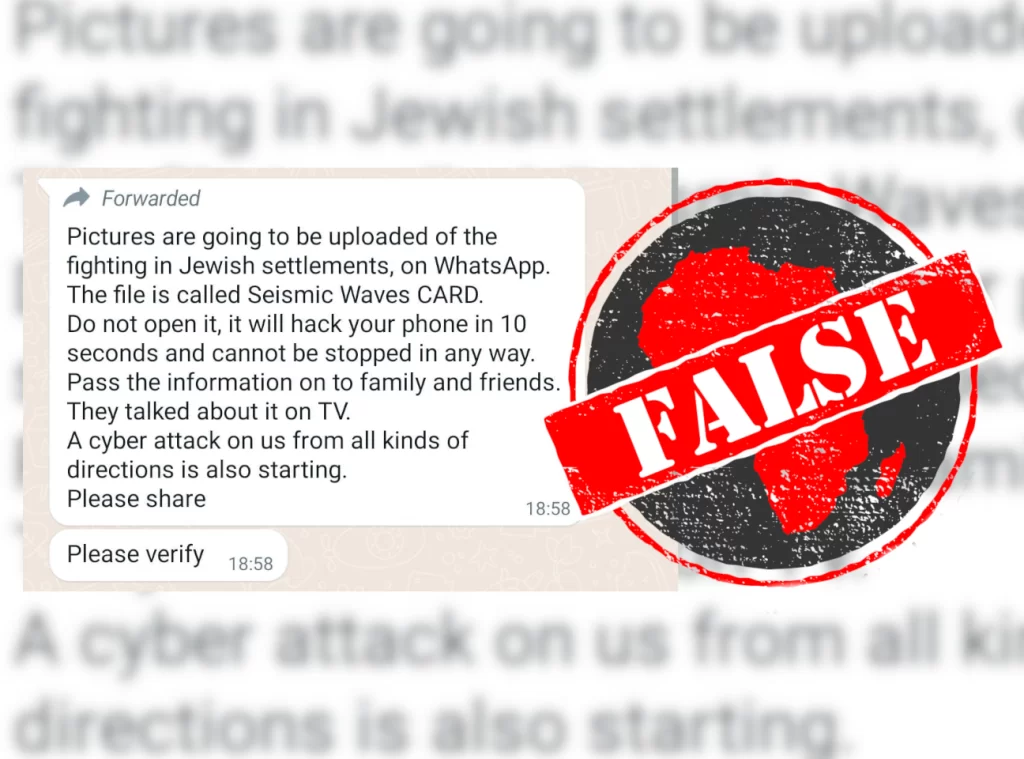No, photos of ‘fighting in Jewish settlements’ will not hack your phone ‘in 10 seconds’ – but never open dodgy files
Claim: Social media messages claim that images “of fighting in Jewish settlements” in the form of “seismic wave card” can hack your phone in 10 seconds. But this zombie claim is still false.
“Pictures are going to be uploaded of the fighting in Jewish settlements on WhatsApp,” starts a message circulating on WhatsApp and sent to Africa Check multiple times by our subscribers.
The claim warns that these photos come in the form of a “seismic waves card” and will hack your phone “in 10 seconds and cannot be stopped in any way”.
The message then tells readers to share the information with family and friends.
The same claim has also made its way onto Facebook and is doing the rounds in South Africa here, here, here and here.
It is making rounds as war rages in the Gaza Strip, a small Palestinian territory on the Mediterranean coast bordered by Egypt and Israel. Palestinians are mostly Muslim, while Israel is the world’s only Jewish state. The Israeli army has waged war on the territory since Hamas, the militant Islamic group which rules Gaza, attacked Israel on 7 October 2023.
However, violent conflict between Israel and the Palestinian people goes back decades. It includes Israelis settling areas in the West Bank considered Palestinian territory by international law, often referred to as Jewish settlements.
Since the start of the current Israel-Hamas war, also known as the Israel-Gaza war, Africa Check has fact-checked many false claims made about the conflict.
But what is this “seismic waves card” showing photos of “fighting in Jewish settlements”? And will it hack your phone in 10 seconds? We checked.

Malware is real, but the claim lacks evidence
The term used for files or links that can hack your phone or computer when opened is “malware.” Malware, also known as malicious software, is design to infiltrate devices and compromise or damage data. Since malware encompasses various online threats, it exists in many different forms. These forms include adware, which displays ads on a device screen and captures user data, and ransomware, which locks users out of their systems or data for a ransom.
However, there is no specific type of malware as a “seismic waves card.” Africa Check previously discovered that searching for this term on Google only yielded other instances of the same claim.
Do not open links and files if you can’t verify their authenticity
If you’re not sure, don’t open any suspicious files or links without checking their origin or authenticity.
US computer security company McAfee offers advice on how to protect yourself from malware:
- Install antivirus software to keep malware at bay.
- Be wary of suspicious-looking websites and what files you download.
- Use strong passwords.
- Don’t open files or click on links from people you don’t know.
- Back up your data regularly.
Zombie claims: red flags we can learn from
Zombie claims are claims that circulate on social media for years, with the message only changing slightly each time.
For example, this claim is only slightly different from a claim that was recently fact-checked. Instead of warning about “pictures of the fighting in Jewish settlements”, a previous version warned of “photos of the Moroccan earthquake”.
This is a classic example of zombie claims, the ones that won’t die, even though it is unfactual. The altered wording makes the claim appear more current, but it’s still false.
Reposted from Africa Check by Taryn Khourie
